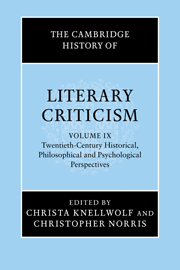Book contents
- Frontmatter
- Introduction
- HISTORY
- 1 Historicism and historical criticism
- 2 Literary criticism and the history of ideas
- 3 Cultural materialism
- 4 New historicism
- 5 Fascist politics and literary criticism
- MARXISM AND POST-MARXISM
- FROM CULTURAL POETICS TO CULTURAL STUDIES
- PSYCHOANALYTIC APPROACHES
- GENDER AND SEXUALITY
- COLONIALISM, POST-COLONIALITY, NATION AND RACE
- MODERNITY AND POSTMODERNISM
- PHILOSOPHY, AESTHETICS AND LITERARY CRITICISM
- INTERDISCIPLINARY APPROACHES
- Bibliography
- Index
- References
4 - New historicism
from HISTORY
Published online by Cambridge University Press: 28 March 2008
- Frontmatter
- Introduction
- HISTORY
- 1 Historicism and historical criticism
- 2 Literary criticism and the history of ideas
- 3 Cultural materialism
- 4 New historicism
- 5 Fascist politics and literary criticism
- MARXISM AND POST-MARXISM
- FROM CULTURAL POETICS TO CULTURAL STUDIES
- PSYCHOANALYTIC APPROACHES
- GENDER AND SEXUALITY
- COLONIALISM, POST-COLONIALITY, NATION AND RACE
- MODERNITY AND POSTMODERNISM
- PHILOSOPHY, AESTHETICS AND LITERARY CRITICISM
- INTERDISCIPLINARY APPROACHES
- Bibliography
- Index
- References
Summary
New historicism emerged in the early 1980s as a turn to history in literary studies after the formalisms of New Criticism, structuralism and deconstruction. The label describes, as Stephen Greenblatt has observed in Learning to Curse (1990), ‘less a set of beliefs than the trajectory’ of related materialist, Marxist and feminist critical practices as they seek to interpret literary works amid the complexities of their own historical moment. An American counterpart to British cultural materialism, its influence has been felt mainly in Renaissance studies, and, to a lesser extent, in eighteenth- and nineteenth-century studies of the novel and Romanticism. Its Renaissance practitioners draw upon diverse strands in modern critical theory (especially Foucault and Althusser), upon the work of cultural historians (by Emmanuel Le Roy Ladurie, Carlo Ginzburg, Natalie Zemon Davis) and on social anthropology (especially Clifford Geertz), in order to read across the boundaries of literature and history. So far as it is possible to generalise about such a vast and varied field, new historicists seek to identify hitherto unacknowledged contexts of semiotic exchange between literary and cultural history.
Characteristically self-conscious in method, new historicist criticism frequently voices an acute awareness of its own procedural difficulties. A key problem, for example, has to do with what kind of sense may, indeed should, be made of the materials of literature and history. New historicism represents a sustained negotiation of those complex cultural, textual and political forces which intervene between past and present, then and now. Its central problem has thus to do with distanciation. On the one hand, the past must be minimally intelligible for history to bear any meaning at all; on the other hand, intelligibility always remains relative to the conditions in which interpretations are made.
- Type
- Chapter
- Information
- The Cambridge History of Literary Criticism , pp. 59 - 70Publisher: Cambridge University PressPrint publication year: 2001
References
- 2
- Cited by

